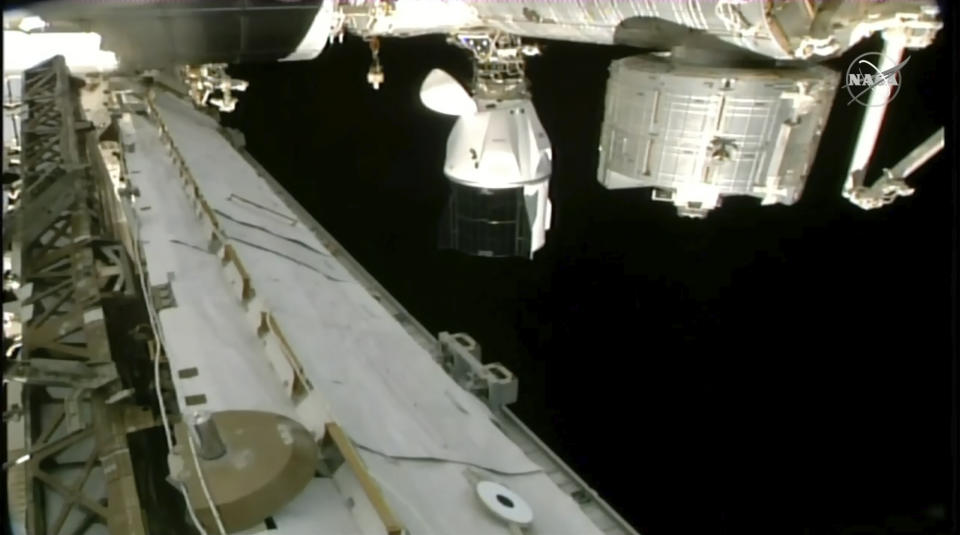

New crew from US, Russia and UAE arrives at space station
(AP) – A new crew arrived at the International Space Station on Friday for a six-month mission, after overcoming trouble with one of the capsule’s docking hooks.
The SpaceX capsule and its four astronauts had to wait 65 feet (20 meters) from the orbiting lab, as flight controllers in California scrambled to come up with a software fix.
It’s the same problem that cropped up shortly after Thursday’s liftoff. Although all 12 hooks on the capsule appeared to be fine, the switch for one of them malfunctioned. SpaceX Mission Control urged patience, telling the U.S., Russian and Emerati astronauts they could stay in this holding pattern for up to two hours.
Once new software commands were relayed, the astronauts received the go-ahead to proceed. In the end, the linkup occurred an hour late as the capsule and space station soared 260 miles (420 kilometers) above the coast of Somalia.
“After a brief scenic detour, welcome to the International Space Station,” SpaceX Mission Control radioed. NASA officials agreed the delay added to the anticipation.
The new arrivals include United Arab Emirates’ Sultan al-Neyadi, the first astronaut from the Arab world who will spend an extended time in space. Al-Neyadi is only the second person from the UAE to rocket into orbit.
“I can’t be happier than this, seeing old friends in space, gathering as a big family. This is the essence of space exploration,” al-Neyadi said upon entering the station. “The UAE is taking a great step toward pushing the boundaries of exploration.”
Also flying up in the capsule: NASA’s Stephen Bowen, a retired Navy submariner who made three space shuttle flights, and Warren “Woody” Hoburg, a space newbie and former research scientist at Massachusetts Institute of Technology, and Andrei Fedyaev, a space rookie who’s retired from the Russian Air Force.
SpaceX launched the four astronauts for NASA early Thursday from the Kennedy Space Center in Florida. Their flight was delayed a few days by a clogged filter in an ignition fluid line.
The UAE sent its first astronaut, Hazzaa al-Mansoori, to the space station in 2019 aboard a Russian rocket. It had been decades since the first Arab launched in 1985 during NASA’s shuttle era. The longest spaceflight by any of them was about a week.
A UAE space official, Hamad al-Mansoori, called the station from Dubai to wish el-Nayadi and his crew a safe and successful mission and said it represented “a huge milestone.”
The space station will be home to 11 people for the next week. The newcomers will replace two NASA astronauts, a Japanese astronaut and a Russian cosmonaut who have been on the station since October and will return in their own SpaceX capsule next week. Two other Russians and an American traveled to the station in September on a Russian Soyuz capsule that had to be replaced because of a leak, pushing their mission to a full year.
1677830212.webp)
A new crew arrived at the International Space Station on Friday for a six-month mission, after overcoming trouble with one of the capsule’s docking hooks.
The SpaceX capsule and its four astronauts had to wait 65 feet (20 meters) from the orbiting lab, as flight controllers in California scrambled to come up with a software fix.
It’s the same problem that cropped up shortly after Thursday’s liftoff. Although all 12 hooks on the capsule appeared to be fine, the switch for one of them malfunctioned. SpaceX Mission Control urged patience, telling the astronauts they could stay in this holding pattern for up to two hours.
“Teams are working to get this right, not just fast,” Mission Control radioed.
Minutes later, new software commands were relayed, and the astronauts received the go-ahead to proceed with the final approach and docking. In the end, the linkup occurred an hour late as the capsule and space station soared 260 miles (420 kilometers) above the coast of Somalia.
It was expected to take an hour before the hatches could be open, the standard time for proper pressurization.
“Now let’s work toward getting this hatch open so you can go hug your crewmates,” NASA Mission Control said from Houston.